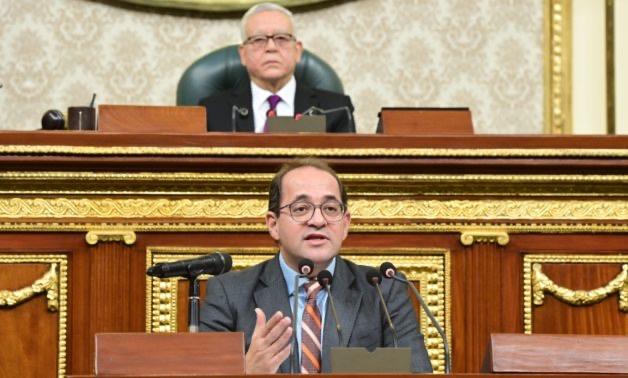
Tax Incentives Mark 'New Beginning' For Partnership With Private Sector: Kouchouck
Kouchouck said the goal is to reduce the tax burden on businesses, attract new investors, and support liquidity. One key measure is the creation of a simplified, integrated, and incentivized system for startups, small and medium-sized companies, entrepreneurship activities, and professionals with a business volume of up to EGP 15m. This system includes exemptions from capital gains tax, dividend distribution, stamp duty, registration and documentation fees, and exemption from withholding or advance payments. It also allows for only four value-added tax declarations annually, with the first tax inspection occurring after five years.
The government has also implemented a centralised clearing system that enables businesses to electronically settle their dues and liabilities with the government. This is intended to provide greater liquidity for businesses. The government is also aiming to reduce the financial burden on businesses by implementing a maximum limit for delay penalties that will not exceed the original tax amount. This is intended to help businesses that face delayed tax inspections or prolonged dispute resolution.
The government is encouraging unregistered taxpayers to register by offering a fresh start without considering past liabilities. This aims to encourage voluntary compliance with tax laws. The government is also building trust with the business community by allowing businesses to submit or amend tax declarations from 2020 to 2023 without penalty. The limit for mandatory transfer pricing studies between related parties has been doubled to EGP 30m annually.
The government is working to accelerate value-added tax refunds and double the number of beneficiaries annually. Documented, non-supporting declarations for corporate entities will be phased out in 2025 and for individuals in 2026. The scope of the sample audit system will be expanded to include all centres, regions, and tax districts.
The government is also renewing the Tax Disputes Resolution Law with simplified mechanisms and facilitations to resolve and settle tax disputes from before 2020. Taxes owed from before 2020, for which disputes have been settled, will be allowed to be paid in instalments for one year without delay penalties.
In addition to the tax incentives, the government is also working on several other initiatives to improve the business environment in Egypt. The government is preparing and issuing a tax policy strategy for 2030 and opening it for public discussion before the end of December. The government is also forming the Supreme Tax Council defining its powers and developing similar packages of tax facilitations and concessions for real estate taxes and the customs system.
Kouchouck also highlighted the government's commitment to fiscal discipline and driving economic activity. He noted that the current budget includes EGP 23bn to support exports and provide the necessary cash flow for exporters, EGP 1.5bn in incentives for companies joining the National Automobile Industry Program, and EGP 50bn to support the tourism sector, increase hotel capacity, and create more job opportunities. He also mentioned plans for export incentives for companies manufacturing mobile phones and a new initiative to convert vehicles to operate on natural gas or electricity.
The minister also highlighted the government's commitment to social protection, human development, and raising the standard of living for citizens. He noted that the first quarter of the current fiscal year saw an increase in spending on social support and benefits to EGP 133bn, representing an annual growth rate of 39.8%. The Takaful and Karama program's cash support rose to EGP 9.6bn.
Spending on food commodities, health, and education also saw significant increases in the first quarter. The government provided support for 330,000 social housing units for low-income families and supported the connection of natural gas to approximately 1.2m housing units.
Kouchouck emphasised that the government is working according to a comprehensive strategy to reduce the value, proportion, and burden of debt, and to limit the external component in the medium term until 2030. He noted that the public debt-to-GDP ratio decreased from 96% in June 2023 to 89.6% in June 2024. The goal is to reach 85% by the end of the current fiscal year. External debt for budget agencies declined by more than $3bn in the past fiscal year, and the aim is to reduce it by $2bn by the end of this year. Fitch Ratings upgraded Egypt's credit rating to B with a stable outlook.

Legal Disclaimer:
MENAFN provides the information “as is” without warranty of any kind. We do not accept any responsibility or liability for the accuracy, content, images, videos, licenses, completeness, legality, or reliability of the information contained in this article. If you have any complaints or copyright issues related to this article, kindly contact the provider above.
Most popular stories
Market Research

- Manuka Honey Market Report 2024, Industry Growth, Size, Share, Top Compan...
- Modular Kitchen Market 2024, Industry Growth, Share, Size, Key Players An...
- Acrylamide Production Cost Analysis Report: A Comprehensive Assessment Of...
- Fish Sauce Market 2024, Industry Trends, Growth, Demand And Analysis Repo...
- Australia Foreign Exchange Market Size, Growth, Industry Demand And Forec...
- Cold Pressed Oil Market Trends 2024, Leading Companies Share, Size And Fo...
- Pasta Sauce Market 2024, Industry Growth, Share, Size, Key Players Analys...





















Comments
No comment